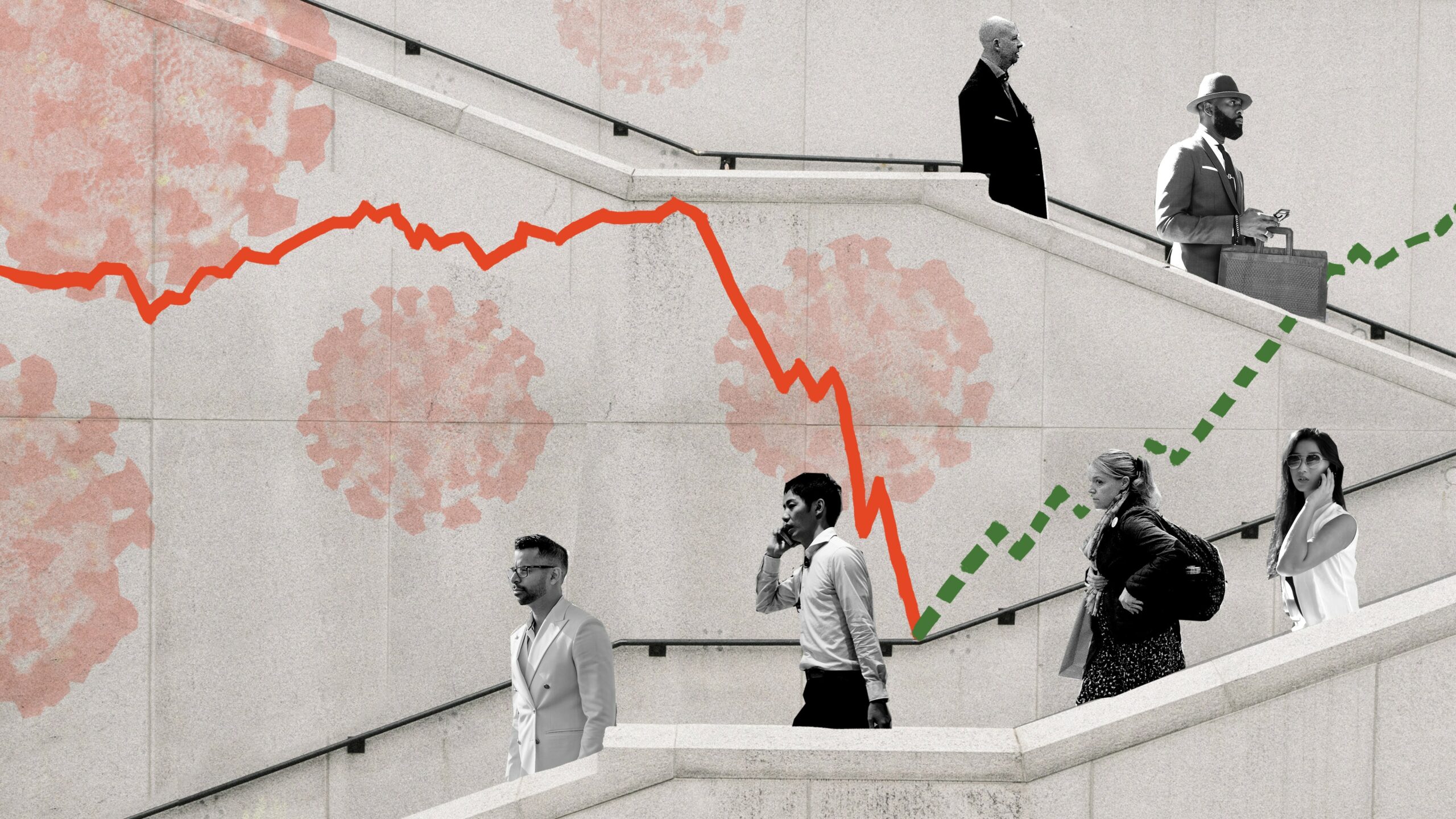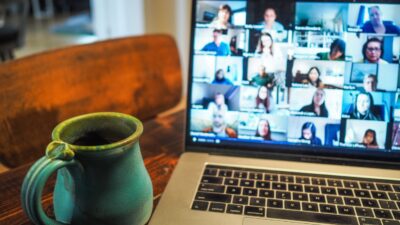Sandra Peter and Kai Riemer

Productivity and remote work on Corona Business Insights
Productivity and remote working: what individuals and managers can do while working from home.
As COVID-19 sets out to change the world forever, join Sandra Peter and Kai Riemer as they think about what’s to come in the future of business.
Shownotes
New challenges for gaming companies: sales are up, but productivity is down
Research on factors needed for an individual worker to be successful in a virtual work environment
A guide to managing remote workers
Our previous conversation about office changes on Corona Business Insights
Research on visibility in remote working by USYD alumna Ella Havermalz
Our research on creating awareness in distributed work environments
This episode is part of a podcast series covering what COVID-19 will mean for the business world, where we look at the impact on the economy, businesses, industries, workers and society. This is part of our ongoing coverage of the impact of COVID-19 on the future of business.
Follow the show on Apple Podcasts, Spotify, Overcast, Google Podcasts, Pocket Casts or wherever you get your podcasts. You can follow Sydney Business Insights on Flipboard, LinkedIn, Twitter and WeChat to keep updated with our latest insights.
Send us your news ideas to sbi@sydney.edu.au.
Dr Sandra Peter is the Director of Sydney Executive Plus and Associate Professor at the University of Sydney Business School. Her research and practice focuses on engaging with the future in productive ways, and the impact of emerging technologies on business and society.
Kai Riemer is Professor of Information Technology and Organisation, and Director of Sydney Executive Plus at the University of Sydney Business School. Kai's research interest is in Disruptive Technologies, Enterprise Social Media, Virtual Work, Collaborative Technologies and the Philosophy of Technology.
Share
We believe in open and honest access to knowledge.
We use a Creative Commons Attribution NoDerivatives licence for our articles and podcasts, so you can republish them for free, online or in print.
Transcript
This transcript is the product of an artificial intelligence - human collaboration. Any mistakes are the human's fault. (Just saying. Accurately yours, AI)
Intro From the University of Sydney Business School, this is Sydney Business Insights.
Sandra And this is Corona Business Insights. I'm Sandra Peter.
Kai And I'm Kai Riemer.
Sandra And with everything that's happening, it's really hard to understand what COVID-19 will mean for the business world. In the series, we'll have a look at the economy, business, industry, government, workers and society.
Kai And today, we look at productivity and remote work.
Sandra In response to theCOVID-19 pandemic many businesses around the world have asked their employees to work from home. For us at the university, most of us are working from home, but across the world, a large proportion of the workforce has been for many weeks now working from home. In the US that number is around 40 percent of the workforce. And for many of these people, it is the first time they have engaged in remote work.
Kai So we want to look at what it means to work from home and how this can negatively impact on someone's productivity, both at the individual level and also at the level of the teams and the groups, and what we can do about it.
Sandra As schools around the world and childcare are no longer available, many people have their kids at home and besides the commitments to work they also have to engage with the children's schooling or just keep them entertained.
Kai And then, of course, there is the issues of motivating yourself when you're not in a work environment. There's the Netflix account that wants you to binge watch more. There's the issue of having access to the fridge all day. So many of the things that we might not have as distractions in an office environment.
Sandra And then there is the issue of social isolation. Whilst we're all socially distancing, many of us miss the interaction that we used to have at the office, the conversations at the water cooler, the team meetings, the face-to-face interactions, which also raises challenges in terms of supervision. For managers, it is quite difficult to know what people on your team are doing and when they're doing it. Some managers might have the feeling that their teams are not being productive, but similarly, employees struggle with not having that feedback that the manager is aware of what they're doing, is seeing them work quite hard under difficult circumstances and so on.
Kai Yeah, so not being seen to be working can be a problem because, you know, you're working hard, but you don't really feel that there's an awareness of your contribution without actually doing something about it. And this is what we wanted to highlight, that while there's many individual level things that distract us from work, it is this team level, this relationship with the other people who we work with, especially your supervisor, that is really important to recreate or uphold when you're in an environment where people do not meet each other regularly and do not actually see each other.
Sandra And there is an interesting article we came across in The New York Times recently talking about a gaming company where the coders that were working in large teams, after the first week of working from home actually struggled to recreate the ease with which they communicated, and to recreate the ease with which they accessed information, or could rely on others to troubleshoot problems or to create solutions together to issues that were arising.
Kai What we forget sometimes is that work is not just a set of individual tasks. It is sometimes important that I can just check in with another worker easily by just going past their desk. We might be working on the same project, especially for agile teams, it has been shown that working face to face, sometimes with a physical task board, is a really good way of having this awareness of how things are going, how everyone is progressing, what everyone is working on, and where in all of this I fit with my own work. Once this embodied physical awareness falls away, all of this has to be painfully recreated in a quite explicit way through communication in the digital space, which takes time. And when teams are not used to working in this style, it might go amiss, and then without this communication, problems occur. And problems go undetected for quite a while because this awareness is no longer there.
Sandra So you're already hinting at some of the solutions that we could implement, both as individuals but also collectively as a team or as managers. So let's have a look at what we could do about this, both in the short term, so during the COVID crisis, and as we come out of it.
Kai So for each individual, it is really important to be much more proactive in checking in with others, in communicating what everyone's working on, making sure that I'm in the picture of what others are doing, but that they're in the picture of what I'm working on, because in particular, in environments where people were used to just gleaning across the room to know what everyone's doing and that is now falling away.
Sandra It's also important not to escalate things very quickly, often without those visual cues and without the social interaction, we tend to think that the other person does not care enough or might not be paying attention to us. It's a lot easier to jump to bad conclusions than it is in a face-to-face environment. And of course, it's quite important to establish guidelines. Rules of interacting, but also schedules both on an individual level and also on a team level. Let's not forget that this has come about quite suddenly. Usually when people are in remote work settings, they would have had a lot of time to set up the rules by which they were engaged, and to refine those, to train new people into how to do this. Whereas most of us were just thrust into this situation pretty much one week to the other.
Kai And we've joked on the last episode that, you know, the digital transformation, in many organisations was not done by the CEO or CTO, but by COVID-19. But we want to point out that giving someone a laptop and an account to a collaborative software is not the same as a measured, effective digital transformation, where teams learn step-by-step how to recreate those communication and coordination practices when they move from a physical to an online or remote work environment. And we should also not forget that this is quite a well-researched area of business practices. For example, managing my own connectivity or the awareness in a team or the rhythms by which teams communicate, is something that people have to take care of more explicitly and have to come up with at the team level. Individuals themselves can make themselves available or unavailable. But if the team doesn't have a rhythm that fits together, a lot of misunderstandings and problems will occur.
Sandra So a lot of these research-based steps that supervisors and managers can implement, or skills that workers can develop have been widely published and they're all mostly still applicable. So things like having very explicit rules around how people communicate in a team, or having regular predictable check-ins at regular intervals that the team can expect and rely on, or trying to use rich technology, not just email to rely on that communication, but visual software where you can also absorb visual cues in an interaction or in the team setting, not just explicit communication.
Kai And while many agile teams are used to the idea of a daily stand-up, for many other people this is quite an alien idea, that I would get together with my team every day or twice a week, which might not have been necessary before moving to remote working, but will now be an essential part of getting on the same page and retaining a shared understanding of what we're working on, how far we're along in the process and the like. So there is lots more overhead to be done in being more explicit and more disciplined in communicating, in coordinating about the work, rather than just working on the tasks at hand.
Sandra And not just about the work, social interactions as well. Whereas a lot of these social interactions would naturally occur before we go into the meeting, around the water cooler, during breaks, around lunchtimes, there would be a lot of social interaction that allows us to talk about things other than just work, they now need to actually be managed. So whether that's having an explicit time at the beginning of a meeting or at the end of the meeting for such interactions, or whether scheduling social catch-ups, Friday afternoon pizzas or drinks with your team, where the focus is not on the work but on everything else.
Kai And then, of course, for managers, it is important to keep an eye on the emotional wellbeing of people as the lockdown progresses, as people are isolated. It's worthwhile making sure to look after those who do not show up to the meetings, who might not be able to attend, not just the stand-ups, but the social gatherings, to just make sure that they are okay and not struggling and at the risk of burning out. And while this sounds like common sense, again, it takes that extra effort, it takes extra work to do this.
Sandra And let's also not forget that different people on the team will respond differently to these measures. For instance, we know there is good research that cultural background is related to virtual work effectiveness, that certain cultures have been found to have higher remote self-efficacy. For instance, people from individualistic cultures seem to work better in remote settings than people from highly collectivist cultures. Similarly, people who are low in uncertainty avoidance are likely to be more effective when undertaking virtual work. And the same is true for people with a high tolerance for ambiguity.
Kai So finally, we want to spare a couple of thoughts about what will happen as we might gradually come out of this lockdown situation, and some people might go back to the office. And to point out that it is important to manage this transition, where all of a sudden it's not everyone who is remote. But some people in the office, some people are remote and managers are now faced with the situation where they have to manage these hybrid teams, where some people naturally can congregate in the office, build a nucleus, and then you almost have these remote satellites. So you have to actually work hard to make sure that this is still one team, and that people who are offsite do not feel that their opinions are not being heard, that they're not being included in discussions. And again, there's a lot of research on what happens in these remote teams that people who are offsite feel a lack of a sense of belonging, for example. It's important not to end up in those situations.
Sandra And also being aware of just the significant overhead of having now teams were a part of the team has returned to work, and part of the team might still be working remotely, as the effort that both managers and team members will have to put into maintaining the communication with their offsite teams will remain, as will the commitments that they have to working in the face-to-face environment.
Kai But I want to make a final point. Many proponents of digital work practices have seen the COVID-19 crisis as an opportunity to move organisations to better and more remote working. But the success of such a move hinges on how well this remote work environment, which in many instances came about by accident, is being managed, the experience that people have during this lockdown with remote working. Because otherwise we're at risk of achieving the opposite, that people come out of this with a really bad experience, they've been lonely, they've been less productive, their voice in the team has been less heard. And they come out of this and say 'remote working really doesn't work. It's not for me'. And will really want to go back to old-fashioned office-based work practices, when in fact it might just have been the experience of but not the very nature of what remote working could be like.
Sandra And that's all we have time for today, we should engage in virtual lunch now.
Kai Guten appetit!
Sandra See you next week on Corona Business Insights.
Kai Thanks for listening.
Sandra Thanks for listening.
Outro From the University of Sydney Business School, this is Sydney Business Insights, the podcast that explores the future of business.
Close transcript













